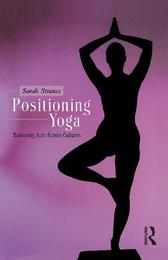
|
Positioning Yoga: Balancing Acts Across Cultures
Hardback
Main Details
| Title |
Positioning Yoga: Balancing Acts Across Cultures
|
| Authors and Contributors |
By (author) Sarah Strauss
|
| Physical Properties |
| Format:Hardback | | Pages:224 | | Dimensions(mm): Height 234,Width 152 |
|
| Category/Genre | Oriental and Indian philosophy
Exercise and workout books |
|---|
| ISBN/Barcode |
9781859737347
|
| Classifications | Dewey:181 |
|---|
| Audience | | Tertiary Education (US: College) | |
|---|
|
Publishing Details |
| Publisher |
Bloomsbury Publishing PLC
|
| Imprint |
Berg Publishers
|
| Publication Date |
1 December 2004 |
| Publication Country |
United Kingdom
|
Description
What is yoga? Stereotypical images of people practicing this ancient art range from white-bearded Indian mystics chanting 'om' on mountaintops to urban fitness fanatics contorted into uncomfortable looking positions. We recognize the name, but may not realize how the set of ideas and practices known as yoga moved from its birthplace on the Indian subcontinent to become a global phenomenon. Positioning Yoga considers how the recent development of yoga, from its introduction to Western audiences by the Indian Swami Vivekananda at the 1893 Parliament of the World's Religions in Chicago through to the present day, has generated specific forms of modern practice. Strauss takes us on an illuminating journey from India to Germany and America, and back again to India. While acknowledging yogas point of origin, Strauss explores how yogic practices and ideas have been transformed when they cross cultural boundaries.Yoga can be defined in many ways as an attitude, a philosophic system, a set of practices, a way of being in the world but its definition is always located within a particular historical context. What makes yoga practitioners affiliated with Swami Sivanandas Divine Life Society of Rishikesh, India - whether they hail from India, North America, or Europe - unique? What values around the world have supported the surging popularity of yoga over the past century? This absorbing book considers how lifestyle values have made yoga a global industry and shows how culture is produced and disseminated across boundaries.
Author Biography
Sarah Strauss is Associate Professor of Anthropology, University of Wyoming .
Reviews'This wonderful study takes yoga out of the realm of Orientalism and Western romantic clich and shows that it is truly a flexible and circulating system of ideas, both in its bodily techniques and as an example of the cross-cultural flow of ideas about health, lifestyle and well-being. This is an exciting contribution to the study of global cultural flows at the same time as it shows how a specialized religious idiom can become a dynamic global industry. It will be of great interest to anthropologists, Asianists, scholars of religion and to the general reader who is curious to know how yoga really flows.' Arjun Appadurai, New School University 'Provides the reader with much valuable historical data, insightful analysis and stimulating interpretative constructs.' Elizabeth De Michelis, University of Cambridge 'Strauss has given us a marvellous account of the local and global forces that have shaped Sivananda's brand of yoga. This book is required reading for those who are interested in the globalization of culture.' Peter van der Veer, Utrecht University 'Drawing on her long-term practice and extensive theoretical studies of yoga, Strauss shows an impressive knowledge of this alluring relaxation technique, which is everywhere around us. This is an engaging book about health, fitness and spirituality.' Helena Wulff, Stockholm University 'I enjoyed 'Positioning Yoga' as a warm and scholarly tribute to a remarkable exponent of mainstream modern yoga and his disciples. Strauss's careful fieldwork will be of value to academic specialists, practitioners of yoga and a wide range of more general readers'. David Gosling, THES 'Overall this is an enjoyable book with sections that can be utilised as readings in the ethnography of modernity and globalisation, of bodily practice and the consumption of ideology.' Olga Demetriou, Social Anthropology (No. 15.3, 2007)
|